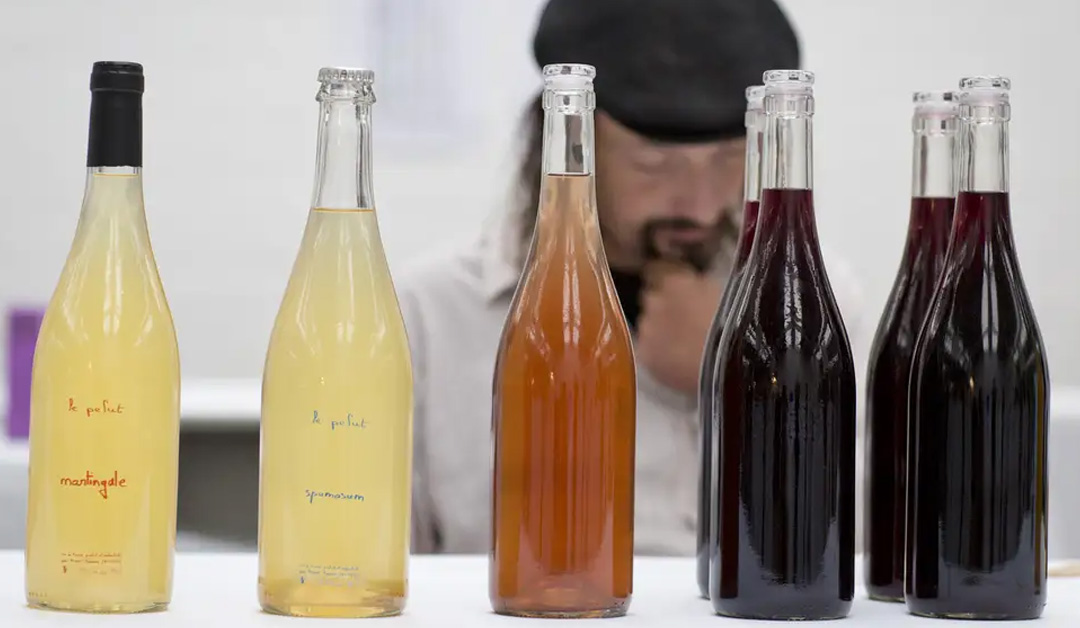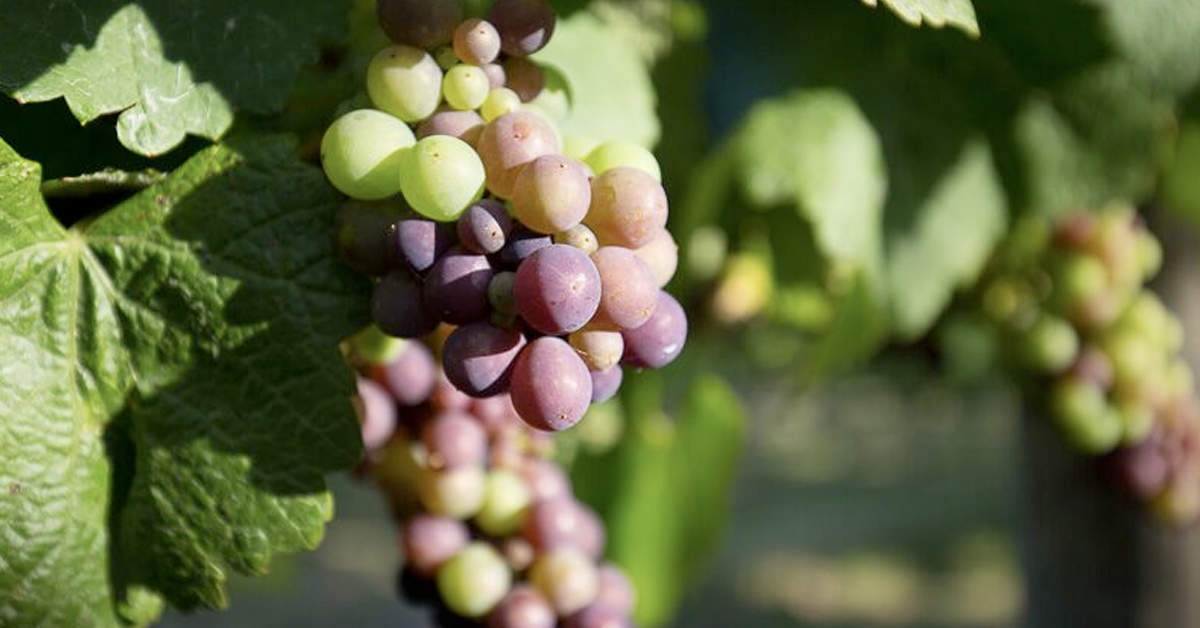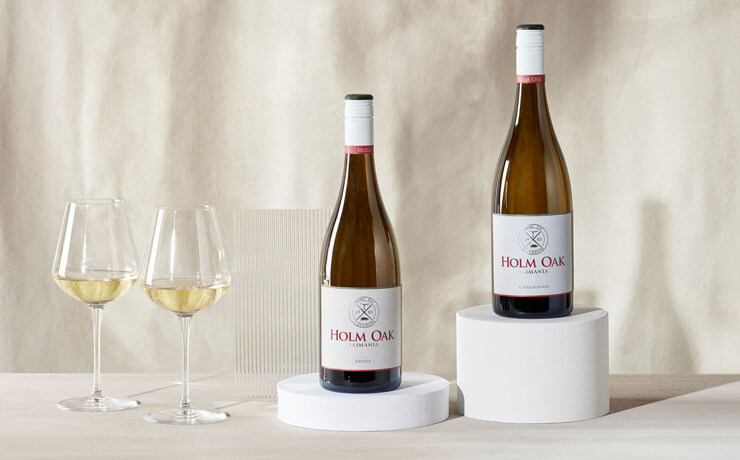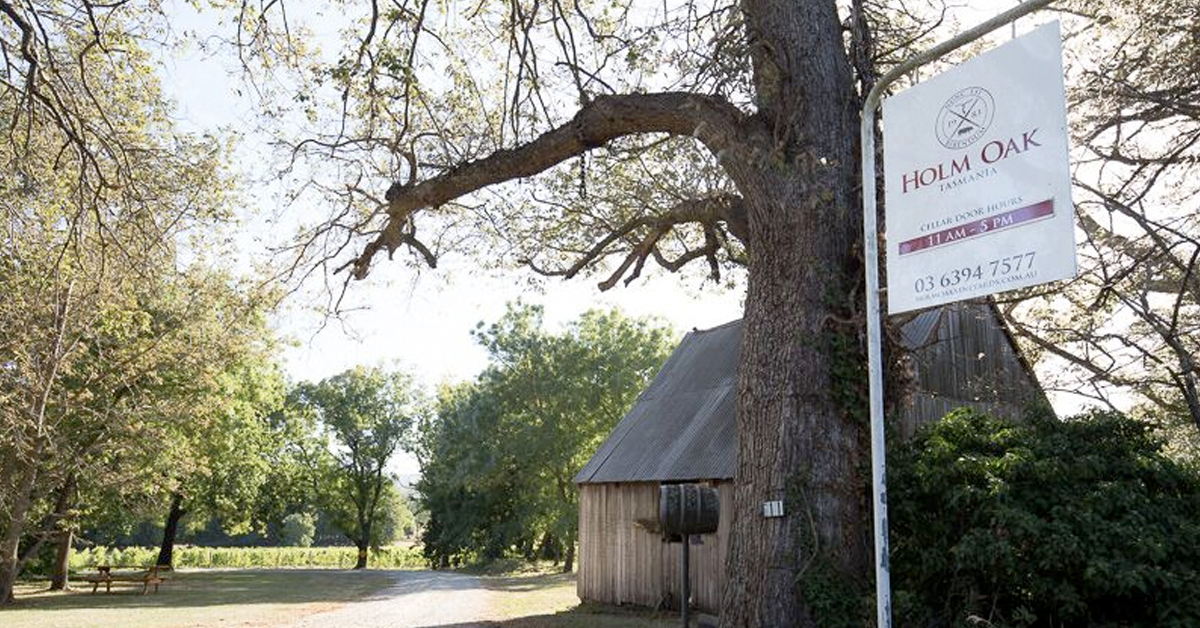Natural wine – a winemaker’s view

People often ask me the question, “What is a natural wine?” and it’s a good one. As far as I’m aware, there is no legal definition for this, so you need to rely on the honesty of the producer as to what they have (or in most cases, haven’t) done to the wine.
What is a natural wine?
For me, it would be that a natural wine is made from organically grown grapes. It has no additions of yeast enzyme, acid, tannin, fining agents (such as egg whites or milk) and less than 30ppm (parts per million) of total sulphur. The wine will not be filtered.
Some people may get natural wines confused with ‘orange’ wines. These are white wines that have been fermented on their skins. They may be natural, but not necessarily so. Natural wines might also be fermented in vessels other than stainless steel or oak barrels, such as amphora, concrete or ceramic.
The pros and cons of natural wine
If a natural wine is made well and the winemaker has been meticulous in their cleaning and approach to winemaking, then natural wines can be great. By taking a truly minimal approach the winemaker is allowing the character of the vineyard including its microflora to be expressed in the wine, without having an impact on the wine themselves. However, I find many of them have characteristics I don’t enjoy. A couple of these are the flavours of acetic acid (vinegar) and a spoilage yeast called Brettanomyces (which makes wine taste like wet dog or Band-Aids!).
Winemakers call these faults, but other people like them. To me, they are not enjoyable flavours and I try to avoid them in my wine. However, some other beverages actively encourage those characters. Cider makers sometimes use Brettanomyces yeast for fermentation and there are plenty of sour beers on the market in which acetic acid is perceived as a positive feature (though not by me).
The difference between organic, biodynamic and natural wine
Organic and biodynamic wines are wines made from grapes that have been either organically or biodynamically grown.
Organic grape growers cannot use synthetic pesticides or herbicides, and are able to use only half the amount of preservatives that non-organic producers can.
Biodynamic grape growers take a holistic, ecological and ethical approach to viticulture. Biodynamics is based on the work of philosopher Dr Rudolf Steiner. The methods unique to this biodynamic approach include its treatment of animals, crops and soil as a single organism. In addition to organic biological practices, biodynamic practices also incorporate metaphysical aspects of farming. Farmers who practice a biodynamic approach consider the life force of the farm. Farming is also done by phases of the moon, which determines the time of planting, fertilising, pruning and picking.
While I do find biodynamics fascinating, there are parts of this type of farming that my scientific mind struggles to grasp, in particular the connection with astrological and lunar cycles, and that preparation 502 is made in stags’ bladders! Which leads me to wonder if biodynamic wines would be vegetarian and vegan-friendly.
Natural wines are generally made using organic or biodynamically grown grapes, and are made with minimal or no additions.
Wine is ‘made in the vineyard’
The way that vines are grown will have a big influence on the outcome of the wine. How the vines are pruned, the way they are trained (trellised), the canopy management of the vine, the nutrition and water they receive, the under-vine weed management, whether or not the vines are crop thinned, and the timing and method of picking are all important factors in determining the outcome of the wine.
The role of sulphites
There can be a little bit of confusion around the use of sulphur in the vineyard and sulphur dioxide in the winery. Sulphur is a spray used to control powdery mildew and mites in the vineyard. As it is a natural product, it can also be used in both organic and biodynamic practices. This doesn’t mean it’s necessarily better for the environment, and it is known to kill spiders, which cause no harm to grapes.
Sulphur dioxide is a preservative used in the winery to control oxidation and to prevent the growth of spoilage organisms such as bacteria and yeast. As I’ve mentioned previously, organic wines are required to contain less than half the allowed sulphur dioxide of non-organic wines. However, the usage rate by non-organic producers is very high and the majority of non-organically grown wine (particularly those from premium producers such as Holm Oak) would contain less than the allowed amount for organic producers (which is a total of 150ppm). While there are no regulated guidelines for natural wines, most natural wine producers would use very little, if any, sulphur dioxide.
Natural wines – how they age
I don’t have a lot of (any) experience in tasting aged natural wines. However, based on my training and knowledge of ageing wines, I would probably not age these styles. The low level or absence of preservatives would mean that the wines would age more quickly. Also if there are active yeast or bacteria cells present, they can cause a secondary ferment in the bottle which may result in ‘off-flavours’ being formed.
The flavour profile of natural wines
Like any wines, the taste of a given wine will vary considerably depending on the variety and how it was made. Some natural-wine makers may do a lot of skin contact with their white wines, which will result in wines with higher levels of tannins, potentially making the wine taste more bitter (a bit like leaving a tea bag in water for a long time, and ending up with strong tannins). Others may prefer no skin contact.
Some natural-wine makers may try and prevent oxidation through the use of an inert gas, such as carbon dioxide or nitrogen, ensuring their tanks and barrels are topped regularly. This excludes as much air as possible to reduce the occurrence of oxidation.
A small amount of oxygen in wine can be beneficial, as it assists in the polymerisation of tannins (where the tannin molecules join together and become bigger, resulting in a rounder tannin structure). It can also add texture and weight to a wine. However, flavour and aroma molecules can be oxidised easily, which means you may lose more of the fruity characters of the wine.
As natural wines aren’t filtered or have not been well settled, yeast cells will still be present in the wine, which can impart a more cheesy, yeasty character.
So, as a broad generalisation, I would describe natural wines as being less fruit driven and more savoury in style
Regional natural wine producers
Natural wines can be made in any region, and they’re becoming increasingly widespread. However, producers in the Adelaide Hills in South Australia are already become well known for their production of this style.
The difference between natural wine and ‘regular’ wine
In some cases there may be very little differentiation between the two. It might only be defined by the use of filtration and a small amount of sulphur dioxide (both of which may extend the life of the wine).
However, more commercially made wines might include the additions of acid, tannin, enzymes, yeast, bacteria and a number of different fining agents to make a wine that is more reliably consistent from year to year.
At Holm Oak, our approach is somewhere between the two. We are not an organic or biodynamic vineyard, but we are part of Tasmania’s sustainability program VinØ. We use chemicals sparingly in the vineyard and only spray when required, rather than following a set spray program. We use a mix of organic and synthetic fertilisers, and use only organic insecticides targeted for specific insect problems.
In the winery, the approach we take depends on the wine we are trying to make. We make minimal sulphur additions, and most of our wines have less than 100ppm total sulphur. All our pinots except the Protégé, both of our chardonnays and our arneis are wild fermented. We don’t add acid to our wines, and only occasionally add tannin if it’s required (mostly to our bigger red styles). We fine our wines to remove bitterness with either skim milk (white wines) or egg whites (red wines), which we purchase from local suppliers. Most of our wines are filtered to ensure stability in the bottle; however, our Wizard and Hotshot Pinots are unfiltered.
The last word on natural wines
My philosophy is that wine is made to be enjoyed. I don’t necessarily want the wines I drink to challenge my palate; I want them to relax my brain, complement my meal and be appreciated with friends. Many of the natural wines I’ve tried, I’ve not enjoyed. They’ve not matched well with the style of food I eat, so they’re not something I drink very often. I do, however, believe in growing grapes and making wine with minimal input and the least impact on the environment – which is what comes naturally to me!



